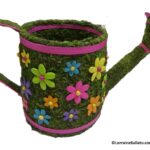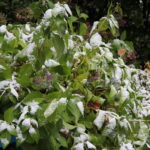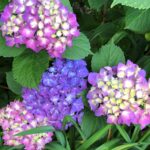EXTREMELY COLD WINTER TEMPS

Table showing temps in winter 2017-2018
2018 WINTER IMPACT ON OAK LEAF AND CLIMBING HYDRANGEAS
I was relieved to find that all my oak leaf and climbing hydrangeas had buds on them.
2018 WINTER IMPACT ON BIG LEAF HYDRANGEAS
But then I had to muster the courage to inspect the troublemaker. Off I went to examine winter’s impact on hydrangeas that bloom on old and new wood. I have a variety of rebloomers (see list below). I also have some old wood macrophyllas like Lady In Red. Intentionally and unintentionally, my macrophyllas are scattered throughout various parts of my property with different levels of exposure to the elements. Here’s what I found.
As in prior years, the buds on one Lady In Red which blooms only on old wood were alive and well. This plant was protected from the prevailing weather by a neighbor’s house. The second Lady In Red was not so lucky: some tips and stems were clearly dead and showed no signs of life while other tips had live buds on them. Sadly, the first plant that came through winter with no scratches was later to suffer damage from a rare, freak tornado that tore into the plant. She is now badly damaged but still alive. The plan is to give her a severe cut back and reshaping after flowering to restore her.
Then I traversed the yard. Of my Endless Summer® , The Original collection, some had complete dieback, as shown in this photo (it is now regenerating from the base).

2018 Winter Impact on this hydrangea killed all old stems. New growth is coming back from the base.

Winter’s impact on this hydrangea killed some stems. New growth comes back from surviving stems.
WHICH BIG LEAF HYDRANGEAS WERE LEAST DAMAGED BY WINTER
BloomStruck® came through the best of all my Endless Summers® and the best of my entire collection of rebloomers. It is loaded with flowers at the tip of the stem on its prodigious new growth. The photo below shows what the plant looked like on May 4 after a very cool and gray April. The flowers are just starting (late June in CT) to color up.

Endless Summer BloomStruck® displaying full buds in early May with no winter dieback.

Bud emerging in June from what might have been thought to be a dead tip in April
2018 WINTER IMPACT ON OTHER REBLOOMING HYDRANGEAS
*Other rebloomers I assessed:
- Endless Summer® Blushing Bride, Twist–n–Shout®
- ‘David Ramsey’
- Double Delights™ Wedding Gown, Perfection, and Star Gazer
- Everlasting™ Revolution
- Forever & Ever® Peppermint
- Let’s Dance® Blue Jangles®
- Midnight Duchess®
- Mini Penny™
- Nantucket Blue™
- ‘Penny Mac’
- Pink Shira™
- Queen Of Pearls®
LESSONS FROM 2018 WINTER
Inasmuch as I can’t control the weather, when I analyze which of my plants did what, I draw two major conclusions:
- First, the plants that did the best were those that enjoyed winter protection from one or more of several sitings: dry winter persistent foliage which might have been needled conifers like Alberta spruces or overhead junipers. They might have had oaks that held their foliage and helped block icy winter winds. In some cases, there was a garden shed or a house or fence which served as protection. Additionally, rhododendrons and azaleas protected some plants. Make them think they live in a warmer zone.
- My second conclusion is that reblooming hydrangea macrophyllas are the only way to go. Where the tips of my plants died back, it is their reblooming capability that are producing the flowers along the stems. The magic of rebloomers is the answer for cold climate gardeners and can only enhance performance for gardeners everywhere else.
COMING ATTRACTIONS
I’ll be back in a few days with PART TWO of my report. That one will detail how my hydrangea serratas, the mountain hydrangeas, made it through the winter.
6 Secrets for Stunning Hydrangea Flowers
Get my FREE mini-guide with 6 fool-proof tips showing how to grow hydrangeas that produce the most amazing flowers.
No spam - I promise!




